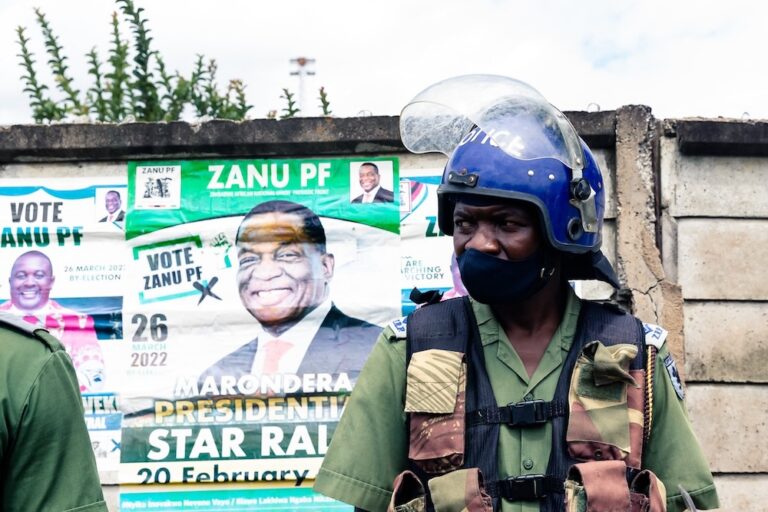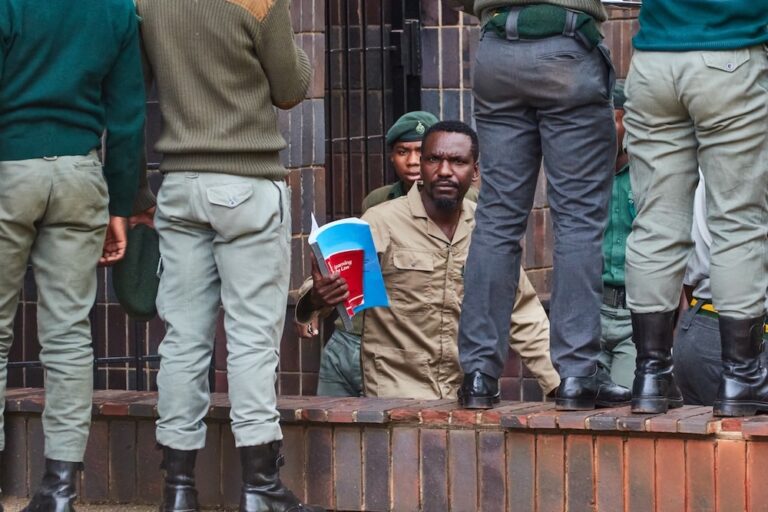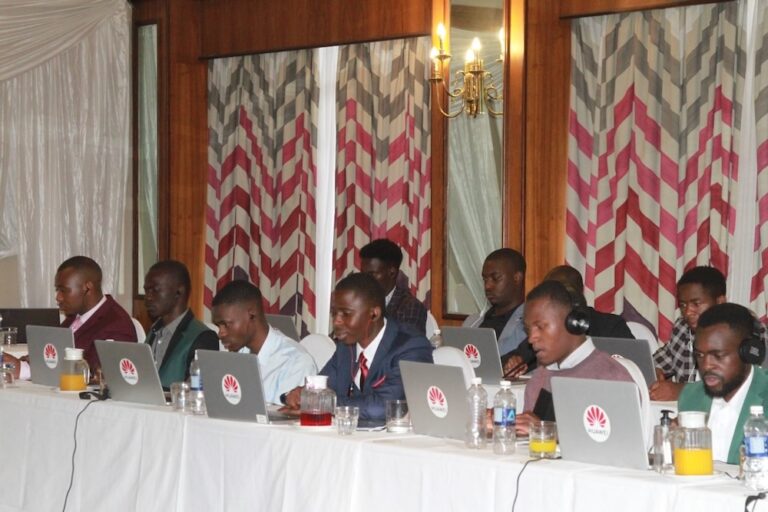(MISA/IFEX) – Civil and human rights groups in Zimbabwe have objected to the retention of several clauses in the revised Public Order and Security Bill. The bill is currently being reviewed by the Parliamentary Legal Committee to determine its constitutionality, while the House will reconvene on 18 November 1997. The clauses infringe directly on the […]
(MISA/IFEX) – Civil and human rights groups in Zimbabwe have
objected to the retention of several clauses in the revised
Public Order and Security Bill. The bill is currently being
reviewed by the Parliamentary Legal Committee to determine its
constitutionality, while the House will reconvene on 18 November
1997. The clauses infringe directly on the freedoms of assembly
and association, movement and expression. If passed, the bill,
which was first tabled before the House in July 1997, will
replace the notorious Law and Order (Maintenance) Act of 1960.
Comparatively, the new bill has dropped the most acrimonious
clauses from the previous law it seeks to repeal. At least seven
harsh sections have been removed. Notable changes include Section
18, which gave powers to the state to ban any publication, and
Section 24, which made civic activities including lobbying the
public to boycott government events or engage in civil
disobedience punishable by life imprisonment. The old law also
gave police powers to tamper with all postal mail, while holding
public gatherings on Christmas Day could have been punished by
five years in jail.
In a joint statement, Zimbabwe’s civil society groups
acknowledged that the changes were “an encouraging attempt” by
the government of Zimbabwe to improve the observation of human
rights in the country, but argued that the new bill still fell
short of adequately promoting fundamental human rights.
The objectionable clauses in the new bill include clause 14: 5,
which requires all Zimbabweans to give a mandatory seven day
notice to police before exercising their right to assembly. The
police have discretionary powers to approve or block the assembly
on grounds of public security. Civil society groups argue that
this right is still meaningless as long as it remains at the
grace of a police officer. They add that seven days is too long a
notice to allow citizens to respond to urgent issues. Under this
law, a magistrate of a court would also have sweeping powers to
ban all forms of assembly in designated areas should the court
feel so inclined.
Clause 16 gives a police officer of the rank of inspector powers
to impose curfews and restrict public movement outside the
approved hours. He is not obliged to give reasons or prior
warning of the impending curfew. The police officer also has
powers to cordon off any public gathering or area and disperse
people.
In clause 12, the new bill makes it a criminal offence for any
individual or media outlet to utter, publish or distribute news
deemed by the state to be subversive. It does not, however,
define what would constitute a subversive statement. In the
previous law it included harsh criticism of the President.
Persons found in contravention of this clause will be fined up to
US$ 2500 or five years’ imprisonment, or both.
The civil society groups also question why the bill makes it an
offence for people to incite hatred based on race, religion or
tribe, but not sex. They also object to the inclusion of secrete
service officials in the definition of the law enforcement
agencies that can arrest or disperse assemblies in accordance
with this bill. “The intelligence services are not in the
constitution and therefore not accountable to the public while
the police are,” a joint statement said.
Zimbabwe has several equally oppressive colonial laws that need
to be repealed, such as the Censorship and Entertainments Control
Act, the Official Secrets Act and the Privileges, Immunities and
Powers of Parliament Act. The groups say there is no need to add
to this list, and that the Public Order Act is therefore largely
irrelevant.
The civil society group’s statement was issued by the Catholic
Commission for Justice and Peace, the Legal Resources Foundation,
the Women’s Action Group, the Women and Aids Support Network, the
Zimbabwe Human Rights Association, the Zimbabwe Lawyers for Human
Rights, the Zimbabwe Council of Churches, the Zimbabwe Congress
of Trade Unions as well as opposition members of Parliament. Also
against the bill is the Media Institute of Southern Africa.
Recommended Action
Send appeals to authorities:
civil rights groups in Zimbabwe
fundamental human rights including those of speech, expression,
movement and assembly, and that all minor laws should not take
away from these guaranteed constitutional rights
conform with internationally accepted standards
for broader consultation between those the bill intends to serve
and the legislators
Appeals To
Rt. Hon. Minister Dumiso Dabengwa
Ministry of Home Affairs
11th Floor
Mukwati Building
Private Bag 500D
Harare, Zimbabwe
Fax: +263 4 726 716Rt. Hon. Speaker C. Ndebele
Parliament of Zimbabwe
Nelson Mandela Avenue
P.O. Box CY 298
Causeway
Harare, Zimbabwe
Fax: +263 4 795 548Rt. Hon. Minister Witness Mangwenda
Ministry of Justice, Legal and Parliamentary Affairs
5th Floor
Corner House
Samara Machel Avenue
Harare, Zimbabwe
Fax: +263 4 772 993Rt. Hon. Minister Chen Chimutengwende
Ministry of Information, Posts and Telecommunications
8th/11th Floors
Linquenda House
P.O. Box CY1276
Causeway
Harare, Zimbabwe
Fax: +263 4 707 213 / 720 982Copies to:
His Excellency Comrade Robert Mugabe
President of the Republic of Zimbabwe
Office of the President
Munhumutapa Building
Samora Machel/3rd Street
Private Bag 7700
Causeway
Harare, Zimbabwe
Fax: +263 4 708 557
Please copy appeals to the source if possible.


